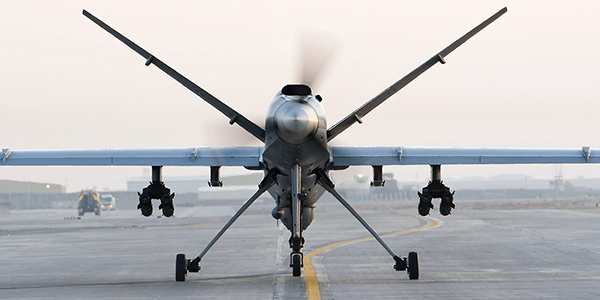When will the government respond to the Intelligence and Security Committee’s report on UK lethal drone strikes in Syria?
It is two years since the Intelligence and Security Committee published its report into UK lethal drone strikes in Syria. Despite a commitment to ‘respond substantively to any report by the ISC within 60 days’ the government has yet to produce a detailed reply to this report. Andrew Defty examines the government’s record in responding to ISC reports and the changing nature of its commitment to doing so.

A Royal Air Force Reaper RPAS (Remotely Piloted Air System). Photographer: Sergeant Ross Tilly (RAF)/ Ministry of Defence Images/© Crown Copyright 2013/ via a(CC BY-NC 2.0) licence
On 26 April 2017, Parliament’s Intelligence and Security Committee published the results of its inquiry into UK involvement in lethal drone strikes in Syria. The inquiry had been prompted by the Prime Minister’s announcement in September 2015 that several UK nationals had been killed by air strikes in Syria including one involving an RAF remotely piloted aircraft – the first time the UK had conducted a lethal drone strike against a terrorist target outside of a military conflict. The ISC’s inquiry focused on the intelligence assessments of the threat posed by those targeted and how that intelligence was used in ministerial decision-making when authorising the attacks.
This was a significant inquiry for the ISC as it marked the first occasion the committee had sought to use new powers, granted to it under the Justice and Security Act 2013, to examine operational aspects of the work of the intelligence and security agencies. The ISC’s mandate in this area is bound by a number of caveats, including that the scrutiny of operational matters must be approved by the Prime Minister. In this case, the ISC reported, ‘the Prime Minister recognised the importance of the issue’ and agreed to allow the ISC to proceed with its inquiry.
The ISC’s subsequent report was, however, highly critical of the government in a number of respects and in particular in relation to its lack of cooperation with an inquiry that it had authorised. While the committee was provided with intelligence assessments in relation to the threat posed by the individuals targeted in the strikes, it was denied access to the submissions made to ministers and information about the decision-making processes that provided for ‘the transition from intelligence activity to military activity’. These, the ISC argued, were ‘issues of significant public interest’. As a result of the government’s lack of cooperation the committee concluded:
Oversight and scrutiny depend on primary evidence: without sight of the actual documents provided to Ministers we cannot ourselves be sure – nor offer an assurance to Parliament or the public – that we have indeed been given the full facts surrounding the authorisation process for the lethal strike…
This criticism went some way beyond that levelled at any government by the ISC since the committee was first established 1994, but what is perhaps just as remarkable is that two years later the government has yet to provide a substantive response to the ISC’s report.
By convention government departments are expected to respond to parliamentary select committee reports within two months. The ISC is not a select committee, but the government began to publish written responses to ISC reports following the election of the Labour government in 1997 and the practice has continued. As with select committee reports, while the timing of government responses has occasionally slipped, these have generally followed a month or two after the publication of ISC reports. The process was formalised in 2013 when the ISC became a committee of Parliament and a memorandum of understanding was agreed between the government and the committee which included the commitment that ‘HMG will aim to respond substantively to any report by the ISC within 60 days’.
However, the timing and also the form of government responses to ISC reports has become less consistent in recent years. The time taken for the government to respond to ISC reports has increased considerably in the last two parliaments. Two general elections in quick succession have undoubtedly had an impact on this, although this does not perhaps explain the length of time taken to respond to some reports or the fact that the government has yet to respond to several reports. The government took nine months to reply to the committee’s Privacy and Security report, which was published shortly before the 2015 general election, and fourteen months to reply to the report on Women in the Intelligence Community, which was published at the same time. It took seven months to reply to the committee’s annual report for 2016–17, which was published in December 2017, while the ISC’s substantial inquiry into detainee mistreatment and rendition which was published in June 2018, did not receive a response until November. Moreover, in addition to the report on lethal drone strikes in Syria, the government has also yet to publish a response to two successive ISC annual reports covering the period 2013–14 and 2015–16, although responses to the two annual reports released since then have been published.
The reason for the long delay in responding to ISC reports is even less clear if one considers that, unlike select committee reports, the government gets advance copies of ISC reports and also exercises considerable control over the timing of their publication. ISC reports are submitted first to the Prime Minister and subject to a process designed to redact sensitive material before being published. As a result, on several previous occasions the government has been in a position to publish its response to an ISC report at the same time as the report was published. In marked contrast, the report on lethal drone strikes in Syria was sent to the government on 16 December 2016, four months before the report was eventually published, which means that the report has now been in the hands of the government for over 28 months.
There has also been a change in the way in which the government responds to ISC reports, which perhaps suggests a more worrying disregard for the committee’s findings. The practice established in 1997 was for the government to publish a substantive written response to each ISC report, responding point by point to the committee’s conclusions. However, on a number of recent occasions, rather than publishing a substantive written response, the Prime Minister has issued a short, written statement to the House of Commons thanking the committee for its work and offering some general comments about the report. This practice was first adopted in 2009 in response to the committee’s second report on the 7 July, 2005 London bombings and was adopted again in 2013 in relation to the committee’s short report on the draft Communications Data Bill.
The Prime Minister provided some comments on the ISC’s drone strikes report in a short, written statement to the House of Commons in December 2017, which also announced the publication of the ISC’s annual report for 2016–17 and the publication of three annual reports by the judicial commissioners responsible for overseeing the work of the intelligence and security agencies. The statement acknowledged the ISC’s conclusion regarding the threat posed by individuals targeted by drone strikes but made no reference at all to the substantive criticisms of the government’s lack of cooperation with the inquiry. In both form and content this short, written statement fell some way short of the detailed responses provided to previous ISC reports. It is all the more striking given that the criticisms in the drone strikes report were directed firmly at the government rather than the intelligence and security agencies.
In the two years since it was published, and 28 months since it first received it, the government has failed to provide a substantive written response to the ISC’s report on UK lethal drone strikes in Syria. This suggests a worrying lack of interest on the part of the government in the work of the Intelligence and Security Committee and more generally in the effective operation of government decision-making in relation to matters of intelligence and national security. The government’s short and insubstantial written statement to the House of Commons in December 2017 in both timing and content fails to meet the government’s commitment ‘to respond substantively to any report by the ISC within 60 days’. At a time when the government’s handling of intelligence is again coming under scrutiny, it would be well-advised not to be so dismissive of the work of the Intelligence and Security Committee.
This post represents the views of the author and not those of Democratic Audit.
About the author
Andrew Defty is a Reader in Politics in the School of Social and Political Sciences at the University of Lincoln. He runs the Watching the Watchersblog at Lincoln University and is co-author, with Hugh Bochel and Jane Kirkpatrick, of Watching the Watchers: Parliament and the Intelligence Services, published by Palgrave.






 Democratic Audit's core funding is provided by the Joseph Rowntree Charitable Trust. Additional funding is provided by the London School of Economics.
Democratic Audit's core funding is provided by the Joseph Rowntree Charitable Trust. Additional funding is provided by the London School of Economics.
[…] in responding to ISC reports and the changing nature of its commitment to doing so. This blog was originally posted on Democratic Audit and is reposted with […]